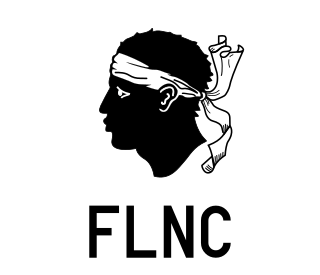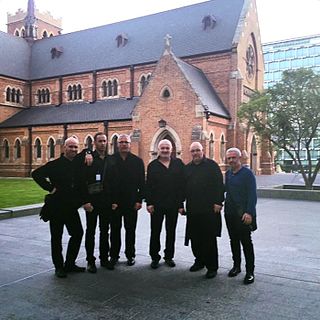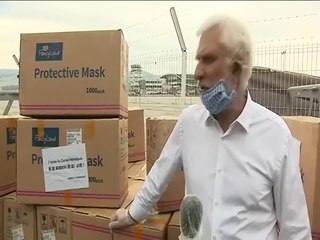Related Research Articles

Corsican is a Romance language consisting of the continuum of the Italo-Dalmatian dialects spoken on the Mediterranean island of Corsica (France) and on the northern end of the island of Sardinia (Italy). Corsican is related to the varieties of Tuscan from the Italian peninsula, and therefore also to the Florentine-based standard Italian.

The National Liberation Front of Corsica is a militant group that advocates an independent state on the island of Corsica, separate from France. The organisation was primarily present in Corsica and less so on the French mainland. A Conculta Naziunalista was often considered to be the political wing of the organisation.

Patrick Chouchayan, known by his stage name Patrick Fiori, is a French singer of Armenian descent.

The Corsicans are a Romance Italic ethnic group. They are native to Corsica, a Mediterranean island and a territorial collectivity of France.

Corsica is an island in the Mediterranean Sea and one of the 18 regions of France. It is the fourth-largest island in the Mediterranean and lies southeast of the French mainland, west of the Italian Peninsula and immediately north of the Italian island of Sardinia, the nearest land mass. A single chain of mountains makes up two-thirds of the island. As of January 2024, it had a population of 355,528.
Casabianca (Q183) was a Redoutable-class submarine of the French Navy. The class is also known as the "1500-ton class" and were termed in French de grande patrouille. She was named after Luc-Julien-Joseph Casabianca. Launched in 1935, she entered service in 1936. She escaped from Toulon during the scuttling of the fleet there on 27 November 1942, and continued in service with the Allied forces. Casabianca, commanded by Capitaine de frégate Jean L'Herminier, had a role in the liberation of Corsica, and was an important link between occupied France and the Free French government based in Algiers.
The Unione Corse is a term designating the Corsican organized crime as a whole during the period 1930s–1970s, in the context of the French Connection, an international heroin trade network operated at that time between Turkey, Southern France, and the United States. A 1972 Time article described the "Unione Corse" as a Corsican-based unified and secretive crime syndicate akin to the American Five Families. The local situation in Southern France during this period was in reality more complex, with a nebula of mainly Corsican and Italian-French clans cooperating or fighting each other according to the circumstances and opportunities. If they constituted a key element of the wider French Connection, flooding the American market with Marseille-produced heroin from the 1950s to early 1970s, those clans remained overshadowed by the much more powerful Italian-American Mafia.
Claude Jean Pierre Érignac was a French prefect on the island of Corsica.

The Greek community in France numbers around between 35,000 - 50,000 people. They are located all around the country but the main communities are located in Paris, Marseille and Grenoble.

A Filetta is an all-male singing group that performs traditional music from Corsica. It's made up of Corsican singers who try to popularize the traditional Corsican Polyphony singing style. To assert its Corsican identity, the group's name refers to a kind of fern that grows on the island.

Corsican nationalism is the concept of a cohesive nation of Corsica and a national identity of its people. The Corsican autonomy movement stems from Corsican nationalism and advocates for further autonomy for the island, if not outright independence from France.
The Corsican mafia is a set of criminal groups originating from Corsica. The mafia is closely tied to both the French underworld and the Italian Mafia. The Corsican mafia is an influential organized crime structure operating in France, Russia, and many African and Latin American countries.
Mafiosa, full title Mafiosa, le clan is a French crime drama television series, which premiered on Canal+ on December 6, 2006. The series was created by Hugues Pagan.

The Corsican Donkey, French: Âne corse, Corsican: U sumeru corsu, is a breed of domestic donkey from the Mediterranean island of Corsica, a région and territorial collectivity of France. It is not recognised by the Ministère de l'agriculture, de l'agroalimentaire et de la forêt, the French ministry of agriculture, or by the Haras Nationaux, the French national stud; nor is it reported to the DAD-IS database of the FAO. Its numbers have fallen alarmingly; two associations are seeking its official recognition as a breed.

The Corsican is a breed of small domestic horse indigenous to the Mediterranean island of Corsica, off the coast of south-eastern France. The breed was officially recognised in February 2012, more than thirty years after the process was begun. The stud-book is kept by a breeders' association, the Association Nationale de Race U Cavallu Corsu. The total population in the island is estimated at approximately 1000. Since the stud-book was established in 2012, about 100 animals have been registered.

The 2015 Corsican protests were a series of marches by several hundred Corsican nationalists that began on 25 December, in Ajaccio, capital of Corsica. During the initial demonstrations, a Muslim prayer hall was burned down and Qur'ans were set alight. Further protests were organised after the initial march despite a government ban on protests until 4 January 2016. The protesters claimed to be acting in revenge for an incident that occurred the day prior when firefighters and police were assaulted in the neighbourhood of Les Jardins de l'Empereur; however, outside observers labeled the ensuing riots as anti-Arab and anti-Muslim. The Corsican nationalist politicians have claimed their view does not legitimise xenophobia, blaming the protest on French nationalism instead. Scholarly opinions on this claim are divided.
Pierre "Pierrot" Bianconi is a French former professional footballer who played as a defender.

Laurent Marcangeli is a French politician who has been serving as a member of the National Assembly from 2012 to 2017 and again from 2022, representing Corse-du-Sud's 1st constituency.
The Departmental Council of Corse-du-Sud is the deliberative assembly of the French department of Corse-du-Sud in the region of Corsica. It consists of 22 members from 11 cantons and its headquarters are in Ajaccio.
Didier Knayer is a French former professional footballer who played as a centre-back. In his career, he played for INF Vichy, Bastia, Béziers, Orléans, and Martigues.
References
- ↑ racines-corses.fr
- ↑ Corse Matin: Pierre Gambini : contrat rempli pour « Mafiosa » (in French)
- 1 2 "Pierre Gambini discography". lescharts.com. Hung Medien. Retrieved 27 April 2014.